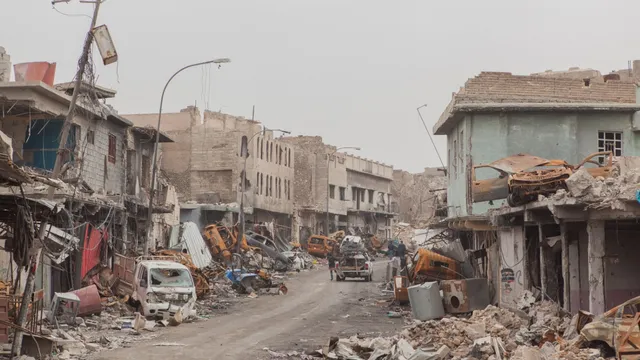
Iran-backed militias in Iraq consider disarmament to evade U.S. strikes
2025-04-10 09:00- Iran-backed militias, including Kata'ib Hezbollah, are in talks to disarm amidst U.S. airstrike threats.
- These groups emerged as part of the Islamic Resistance in Iraq, responding to regional conflicts.
- The decision to consider disarmament aims to avoid military escalation and seek political integration.
Express your sentiment!
Insights
In early 2024, Iran-backed militant groups in Iraq, including Kata'ib Hezbollah (KH) and others, began discussions regarding the potential disarmament of their factions. These discussions were catalyzed by threats of airstrikes from the U.S. following the return of Donald Trump to the White House. The context for these discussions arises from a series of recent military tensions involving these groups and American forces, particularly after U.S. officials expressed grave warnings about further actions if the Iraqi government did not take measures to disband these militias. Reports indicated that some militia leaders started to limit their presence in the country, fearing retaliatory strikes against them could escalate if their operations continued unabated. Moreover, these factions embodied an amalgamation of influence from Iran, given their participation as part of the Popular Mobilization Forces (PMF) during the fight against ISIS in Iraq. The narratives surrounding these groups shifted significantly post-2023, especially after a coalition dubbed the "Islamic Resistance in Iraq" emerged in response to the conflict involving Hamas and Israel. Amidst regional instability, these militias once inclined towards military actions against U.S. interests expressed a desire for a more diplomatic approach to prevent aggravating their already precarious position. As the Iraqi government pushed for stability and took steps towards consolidation, Prime Minister Mohammed Shia al-Sudani sought to integrate these militias into formal political structures, allowing them some voice within the government. Analyst perspectives suggested that disarmament might not only prevent imminent military confrontations but could also be a strategic move to ensure these groups' inclusion within Iraqi political frameworks, thereby reducing Iran's overarching influence in the region in the longer term. Meanwhile, possible agreements hinted towards recognizing the Iraqi government's authority, something previously resisted by these armed groups. As negotiations progressed, reports indicated that the Iranian Quds Force played a role in urging these militiamen to maintain discipline and avoid confrontations with U.S. forces as talks began advancing. The picture emerging from these multifaceted interactions emphasizes a transition for these Iraqi militias from direct military engagement to political and diplomatic solutions as they attempt to navigate an increasingly complex geostrategic landscape, under the watchful eye of American power.
Contexts
The current status of Iran-backed militias in Iraq is a complex and evolving situation that significantly impacts the region's security dynamics. These militias, often referred to collectively as the Popular Mobilization Forces (PMF), were officially integrated into Iraq's security apparatus in 2016 but have evolved into powerful political and military actors since the defeat of ISIS. They continue to maintain a significant presence across various regions of Iraq, particularly in areas previously affected by the ISIS insurgency. Their influence is particularly notable in the capital, Baghdad, and the predominantly Shiite southern provinces, where they engage in various activities, including security provision, governance, and social services. However, their allegiance to Iran raises concerns regarding sovereignty and the potential for increased Iranian influence in Iraqi politics and society. In recent years, these militias have been involved in various militant activities, both in Iraq and beyond, most notably in Syria, where they have supported the Assad regime and engaged in operations against Israeli and US targets. The actions of these groups have contributed to escalated tensions, drawing criticism from both domestic and international stakeholders. Some factions within the PMF have adopted a more aggressive posture, threatening repercussions against US forces and embassies in Iraq, which is a point of contention between the Iraqi government and the US. The government of Iraq has attempted to exert control over these militias while balancing the requirements of its partnership with both Iran and the US. This delicate balancing act is integral to Iraq’s ongoing stability. The political scenario surrounding the Iran-backed militias is continually shifting, especially in light of Iraq's recent elections. Some political parties associated with these forces have gained substantial representation in parliament, which allows them to exert significant influence on policy decisions, including issues related to foreign relations, internal security, and militia regulation. This growing political power has raised questions regarding the future role and funding of the PMF as calls for disbandment and reorganization continue amidst deep-seated divisions in Iraqi society. The continued presence of these militias poses a challenge for Iraqi Prime Minister Mohammed Shia’ al-Sudani, who seeks to unify the country and eradicate corruption, while also managing external pressures from Western allies to curb Iranian influence in the region. In conclusion, the Iran-backed militias in Iraq represent a critical factor in the country's security landscape and have implications for regional stability. Their entrenched position in both military and political spheres complicates efforts to promote a unified Iraqi identity free from foreign intervention. The next steps will heavily depend on the Iraqi government's ability to navigate this challenging environment while addressing the needs and grievances of all citizens. The balancing act between maintaining sovereignty, asserting control over the militias, and satisfying international partners remains one of the most pressing issues facing Iraq today.